History of Co-creation of Value

Course Taken Since the Company's Foundation Aiming to Become a Company that Can Contribute to Customers and Society
Since its foundation in 1905, the Group has striven to become a company that can solve social issues and contribute to society through the stable supply of reasonably priced city gas, sales of gas appliances, and the provision of diversified businesses and services, while competing with companies offering other fuels. Each Group company in its business field has consistently and sincerely tackled issues facing customers and society while upholding three slogans: “pursuit of business efficiency,” “contribution to society,” and “provision of solutions.” By doing so, the Daigas Group has won the trust of customers and society, and has strengthened its competitiveness.
Despite the needs of customers and society becoming increasingly diversified and complex, and competition intensifying, Group companies will work hard together and continue to provide solutions by presenting goods and services that can contribute to society.
History of Growth in the Daigas Group’s Businesses
The Daigas Group’s gas business began with gas supply in 1905. In over 110 years since, the gas business that started with lighting gas lamps has expanded the application of gas to cooking, heating, hot water, and power generation, overcoming many obstacles as society evolved and lifestyles changed. Additionally, founded on the relationships with customers and regions that have been fostered through the energy business, the Daigas Group has expanded its business domains and developed into a corporate group that provides various products, services, and solutions.
See Details [0.4 MB]
The Group's History Since its Foundation
1897: Osaka Gas was founded
1905: Osaka Gas launched its business by starting to supply gas
-

Iwasaki plant (located in then Iwasaki Town, currently part of Nishi Ward, Osaka City)
-
In the middle of the Meiji Era, fires caused by kerosene lamps frequently occurred in densely populated areas including Osaka. In those days, Osaka Gas, in a foundation statement presented to the authorities, pledged to disseminate kerosene lamps and electric lights by encouraging people to switch to those lighting devices from gas lamps. The pledge was part of the Company's activities to solve issues facing society at that time.
1933: “Osaka Gas Building” was completed
-
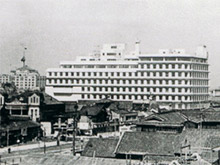
Osaka Gas Building
-
Osaka Gas Building, the head office building of Osaka Gas, was completed in Yodoyabashi, Osaka City. The building, which currently serves as the south building of the Osaka Gas head office, embodied the philosophy cherished by then Osaka Gas Chairman Naokata Kataoka. He said at that time that Osaka Gas must become known and loved by citizens through its gas business. He also said that Osaka Gas Building must act as a place of exchange between his company and citizens and serve as a place to bring citizens closer to the gas business. As pledged by Kataoka, Osaka Gas Building has become a base for promoting exchange with citizens, as well as a cultural dissemination center.
1945: Osaka Gas merged with 14 companies, including Kobe Gas and Kyoto Gas
Osaka Gas became a gas provider that catered to the six prefectures in the Kansai region.
1946: Osaka Gas formed its own labor union
-

In-house work rules for employees
-
In December 1945, a labor union was formed for employees working for the Iwasaki factory in Iwasaki Town, Osaka City. In February 1946, another labor union was formed, this time for employees working for the Kyoto branch, followed by one union after another at its respective business offices.
1970: Gas explosion occurred at a subway construction site
A large explosion involving gas supply facilities occurred in Osaka City. The accident killed 79 people and injured 420.
Immediately after the accident, Osaka Gas set up an emergency team to handle the provision of compensation to the victims' families and to investigate the cause of the accident. Following the accident, the Company strengthened its security and safety system to prevent similar occurrences in the future. Specifically, it established a department tasked with devising security measures and created a 24-hour control center to handle contingencies expeditiously and comprehensively. In 1972, the Company employed a large number of people fresh out of school and deployed many of them in departments related to gas pipeline operations. The deployment was intended to facilitate overall inspections of gas pipes and supply facilities, enhance the safety and security of engineering work, and strengthen patrols to detect engineering works that are conducted without notification to authorities.
1972: Commenced import of LNG from Brunei
-
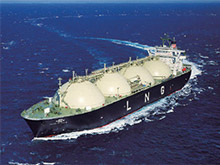
“LNG FLORA” commenced its service
in 1993 -
LNG is superior to other fossil energy sources in terms of environmental preservation, supply stability and economic efficiency. At that time, LNG was drawing keen attention as a next-generation energy source that could respond to the surging demand for city gas backed by the rapid urbanization of Japan and its booming economic growth.
Osaka Gas signed an agreement to purchase LNG from Brunei Cold Gas for 20 years in partnership with Tokyo Electric Power Co. and Tokyo Gas Co. With this agreement, Osaka Gas became the first Kansai-based company to import LNG.
1975: Commenced natural gas conversion
-
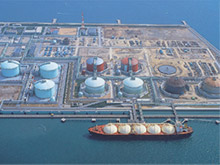
Himeji LNG Terminal
(Shown on the left is Kansai Electric Power Co.'s Himeji LNG terminal.) -
Osaka Gas turned to high-calorie natural gas as its raw material to produce city gas, instead of relying on coal and petroleum for city gas production. In line with this policy change, the Company constructed LNG terminals, established LNG processing facilities and laid gas-supply facilities. In addition, Osaka Gas staff visited all of its customers' residences and sought their cooperation when the staff adjusted their gas appliances to prevent incomplete gas combustion. Osaka Gas replaced gas facilities at a total of 4.4 million households. The number of gas appliances at the households applied adjustment for conversion to natural gas came to 23 million units. Under a 16-year project that was concluded in December 1990 without a single accident.
- Social Events
1933:Opening of Osaka's first subway system (Umeda-Shinsaibashi)
1945:End of the Pacific War, followed by the start of post-war reconstruction of a war-ravaged Japan
1945:Promulgation of the Labor Union Act
1968:Promulgation of the Air Pollution Control Act
1970:Expo'70 world exhibition held in Osaka
1973:Oil Crisis
1980s
1981: “The Small Light Campaign” was launched
-

Charity bazaar held at the facade of Osaka Gas Building
-
The “Small Light Campaign” was launched as a volunteering activity of the Osaka Gas Group aimed at getting each employee of the Group interested in efforts in their own backyards and encouraging them to exercise initiative in resolving problems confronting their local communities.
1984: Osaka Gas launched a gas water heater with a device to prevent incomplete combustion
-

Gas leakage alarm with fire and incomplete combustion alarm function
-
Osaka Gas began developing and selling gas appliances with a function to prevent carbon monoxide emissions caused by incomplete combustion.From the viewpoint of safety multiplexing, we have also made efforts to develop, sell, and promote the use of gas alarms.
1985: Customer centers began operating at three model branches
-

Customer center (Kyoto branch)
-
Customer centers were set up at three model branches in response to applications and inquiries from customers regarding our gas services. Such centers, which served as integrated help desks for customers, had been established at all branches by 1987. Customer centers and Osaka Gas Group companies were linked with each other online via a computer center. The execution of business duties was expedited and business efficiency was realized thanks to the customer centers. In 1987, the “Hello Service” was introduced at all of the Group companies to promote expeditious and adequate response to customers. The service, operated under partnership between Osaka Gas and its service chain, helped enhance customer satisfaction with our service.
1987: Osaka Gas launched the small-sized GHP
-
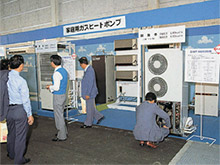
Exhibition of gas engine heat pump
air-conditioners (GHP) (Gas Total Fair) -
Against the background of growing public calls for the development of small-sized air conditioners, which were being sought in terms of energy saving and convenience, the research and technology association for small-sized gas engine heat pump air-conditioners developed household-use GHPs and small GHPs for industrial use, and commercialized them. Established in 1981, the association consists of three utilities Tokyo Gas Co., Toho Gas Co. and Osaka Gas Co. plus about 12 manufacturers.
- Social Events
1981:International Year of Disabled Persons
1986:Bubble economy in Japan
1990s
1992: Formulation of Osaka Gas Environmental Philosophy (Osaka Gas Environmental Activities Guidelines)
To clarify our Company's stance on the environment and further promote environmental activities, the Company formulated the Osaka Gas Environmental Philosophy. To concretize this philosophy, the Company adopted the Osaka Gas Environmental Activities Guidelines. The Osaka Gas Environmental Philosophy states that promoting environmental preservation is an extremely important mission for an energy service provider. It also states that Osaka Gas must recognize the deep linkage between our business operations and the environment, and includes the Company's readiness to bring its business operations into harmony with the environment.
1992: Formulation of the Code of Conduct for Procurement Activities (called CSR-based Purchasing Guidelines)
Osaka Gas has adopted the Code of Conduct for Procurement Activities (called “CSR-based Purchasing Guidelines” ) as a way of fulfilling its CSR in procurement activities as well as establishing relationships of mutual trust between our Company and our suppliers, and promoting mutual development. The Code of Conduct for Procurement Activities spelled out a set of requests to our suppliers regarding material procurement from them.
1995: The Great Hanshin-Awaji Earthquake - suspended gas supply to about 860,000 households in Osaka Gas's business area
-

Collapsed houses and gas meters
-
On January 17, the Great Hanshin Earthquake dealt devastating damage to the Hanshin and Awaji regions, including gas supply facilities operated by Osaka Gas. The Osaka Gas Group suspended gas supply to about 860,000 households on the day of the disaster as a way of preventing secondary damage. A total of 720,000 staff, including those dispatched from gas business operators across the nation, were deployed to the affected regions to repair the damaged gas facilities. On April 11, 1995, the 85th day of the calamity, our repair work was completed without causing a single accident.
1998: Adoption of Osaka Gas Corporate Action Guidelines and Osaka Gas Group Corporate Action Guidelines
Osaka Gas, a public-interest company whose main business pillar is the gas business, adopted the Osaka Gas Corporate Action Guidelines and the Osaka Gas Group Corporate Action Guidelines to fulfill its mission of responding to growing demand from society for the observance of corporate compliance.
- Social Events
1995:Great Hanshin-Awaji Earthquake
1997:Adoption of the Kyoto Protocol at COP 3
1999:Adoption of OECD Principles of Corporate Governance
2000s
2000: Formulation of the Osaka Gas Group Code of Conduct
Osaka Gas adopted the Osaka Gas Group Code of Conduct, a concrete version of the Osaka Gas Corporate Action Guidelines and the Osaka Gas Group Corporate Action Guidelines. The Osaka Gas Group Code of Conduct serves as guidelines for all employees of the Osaka Gas Group, ranging from rank-and-file workers to board directors, to take appropriate actions at a time when business operations of the Osaka Gas Group have become broad-based and diversified.
2000: Adoption of the Green Purchasing Guidelines
Osaka Gas adopted the Green Purchasing Guidelines, which are aimed at promoting not only the optimal procurement of goods, services and engineering work in terms of quality, prices and delivery deadlines, but also environmentally friendly procurement.
2000: Establishment of the Human Rights Center
The Osaka Gas Group set up the Human Rights Center in April 2000 within the Human Resources Department to promote education for human rights awareness in a systemic manner. The Group also created the Human Rights Committee as part of its efforts to establish a system to promote human rights awareness.
2003: Establishment of Compliance Desks
The Osaka Gas Group established Compliance Desks at its head office, Core Non-Energy Business Companies and law offices outside the Company to provide a channel for persons who need a place to seek advice on, and report matters of compliance with, laws and internal rules. Not only Board Directors and regular employees of the Group and workers dispatched from manpower agencies to work for the Group, but also Directors of client companies and regular employees of these companies can seek advice or give reports by phone, email, or in writing.
2006: Adoption of the Osaka Gas Group CSR Charter
Following the adoption in 2005 of the Group's corporate philosophy, Value Creation Management, we set forth the Osaka Gas Group CSR Charter as a way of clarifying our position on CSR to both inside and outside the Company. The charter serves as guiding principles for Board Directors of the Osaka Gas Group and its employees in conducting their business, with the Group believing that creating “value for customers,” “value for society,” “value for shareholders” and “value for employees” -through fair and transparent business activities -constitutes fulfillment of the Group's corporate social responsibility (CSR).
2006: Adoption of the Osaka Gas Group Environmental Activities Policy
We established the Osaka Gas Group Environmental Activities Policy as a way of concretizing the Osaka Gas Environmental Philosophy from three viewpoints--reduction of the environmental impacts of our business activities, contribution of products and services to the reduction of environmental impacts, and contribution to the improvement of the environment in each country and region where we operate. (Integrated into the Daigas Group Code of Conduct in FY2022.3)
2007: Osaka Gas expressed its support for the United Nations Global Compact
Osaka Gas threw its support behind the United Nations Global Compact, a set of principles to be observed by internationally oriented companies amid business globalization, and signed it. Osaka Gas became the first utility in Japan to do so. The Global Compact encompasses 10 principles for enterprises to follow in the four fields of human rights, labor standards, the environment and anti-corruption.
2007: Formulation of The Product Safety Voluntary Action Plan for the safety of household-use gas appliances
We compiled the Product Safety Voluntary Action Plan for the safety of household-use gas appliances. The action plan serves as a standard based on which retailers of household-use gas appliances, as well as engineering firms specializing in facility installation and repair work, and take safety measures. By implementing the action plan, we aim to ensure the safety of household-use gas appliances and foster a culture that leads to product safety.
2007: Osaka Gas obtained integrated certification for ISO 14001 international environmental management standards.
Since its Production Department (currently the LNG, Power & Engineering Business Unit) became certified to comply with ISO 14001, international standards for environmental management systems (EMSs), in 1997, Osaka Gas expanded its scope of EMS operations to other business sites, resulting in the entire company acquiring integrated ISO 14001 certification in 2007. Since the acquisition of Company-wide certification, we have striven to maintain our status as an ISO 14001 certified company and ensure that all employees work to further reduce the environmental impact of our operations and comply with environmental laws and ordinances.
2009: Development and sale of the home-use fuel cell “Ene-Farm” (polymer electrolyte fuel cell: PEFC)
-

“Ene-Farm”
Polymer electrolyte fuel cell (PEFC) -
Osaka Gas was a pioneer in developing a home-use cogeneration system as part of its efforts to help realize a low-carbon society through the efficient use of energy sources. In 2009, the Company launched “Ene-Farm, ” the world's first home-use fuel cell.
2009: Adoption of the Osaka Gas Environmental Policy
As a company whose mission is to supply city gas to households, we formulated the Osaka Gas Environmental Policy based on Charter Ⅱ of the Osaka Gas Group CSR Charter, “Harmonizing with the Environment and Contributing to Realizing a Sustainable Society. ” The policy calls for the Osaka Gas Group to promote environmental conservation, energy saving and the efficient use of energy sources in undertaking its business activities. The Company has been disseminating the content of the policy to all employees in charge of the management of the environmental management system (EMS), while urging them to take environmental actions based on the policy.
- Social Events
2004:Promulgation of the Whistleblower Protection Act
2006:Promulgation of the Anti-monopoly Act,
promulgation of the Companies Act, announcement of the guidelines for Principles for Responsible Investment
2010s
2010: Adoption of the Osaka Gas Group Biodiversity Policy
Osaka Gas adopted the Osaka Gas Group Biodiversity Policy as a way of deeply recognizing the linkage between its business operations and biodiversity, and taking action based on this recognition. The policy was formulated based on the idea that various benefits brought about from biodiversity were essential for people.
2011: Osaka Gas provided support to repair gas facilities damaged by the Great East Japan Earthquake and Tsunami
-
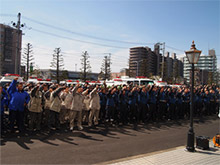
Ceremony to accept staff from across Japan in charge of repairing damaged gas facilities
-
The March 2011 earthquake that originated in the waters off the Sanriku region in Miyagi Prefecture and the subsequent tsunami left gas supply suspended at about 460,000 households in the Tohoku and Kanto areas. At the request of the Japan Gas Association, Osaka Gas and other major utilities deployed their staff to repair gas facilities damaged by the disaster. Following these initial support activities centering on the repair of gas facilities, the Osaka Gas has undertaken various other support activities for the affected people and regions, including volunteering activities by its employees.
2014: Adoption of the Osaka Gas Group Diversity Promotion Policy
The Group formulated the Osaka Gas Group Diversity Promotion Policy to establish a solid organizational structure by which new value can be created, with the aim of enhancing our corporate value. By promoting the policy, we aim to help create a society in which socially vulnerable people can exert their abilities without being placed in a disadvantageous position.
2015: Adoption of the Osaka Gas Group Corporate Principles
Osaka Gas adopted the Osaka Gas Group Corporate Principles as part of its efforts to transform itself into a comprehensive energy service provider. The principles, which serve as the basic value for our Group management, were set in the wake of significant changes in the business environment surrounding the Osaka Gas Group, including liberalization of the electric power and gas markets.
2015: Adoption of CSR Procurement Guidelines for Gas Appliances, etc.
Osaka Gas adopted CSR procurement guidelines regarding our purchase of gas appliances, other gas-related facilities and equipment, and parts constituting such appliances and equipment. The guidelines were intended to deepen the understanding of parts and appliance suppliers of our basic CSR procurement policy and for them to fulfill CSR jointly with us.
- * The guidelines were renamed “CSR Procurement Guidelines for Gas Appliances, etc.” in 2018.
- * In 2020, the guidelines were revised into the "Daigas Group Procurement Policy" and "Daigas Group Procurement Policy for Suppliers."
2016: Osaka Gas began supplying electricity to households and small-lot business users.
Japan reviewed its domestic energy policy following the Great East Japan Earthquake, spurring state-led reform of the electricity and city gas markets. In April 2016, retail sales of electricity were completely liberalized, prompting the Osaka Gas Group to start supplying electricity to customers in the six prefectures in the Kansai region.
2018: Adoption of “Daigas Group,” the new Group brand
The adoption of the “Daigas Group,” our new group brand, symbolizes and announces, both inside and outside the Group, the passion that each Group employee should hold in working to build “an innovative energy and service company that continues to be the first choice of customers,” the Group's long-term management vision. The concept is “Dynamic and Innovative, Genuine and Studious.” The term Daigas represents the Dynamic and Innovative vision we must realize and the genuine and studious mindset that we have kept for over 110 years.
2018: Established CD Energy Direct Co., Ltd., an energy sales company in the Tokyo area
On April 2, 2018, the Daigas Group, jointly with Chubu Electric Power Co., established CD Energy Direct Co., Ltd., a new company offering services related to gas and electricity, daily life and business in the Tokyo area.
The business resources and know-how the two companies have cultivated in their respective gas and electricity businesses will be integrated and fully utilized in the Tokyo area. The new company will also offer maximum value to households and companies through competitive sales of gas and electricity.
Moreover, through services using IoT technologies, the company will create new values that are useful to our customers' lives and businesses, with the aim of offering new business models and services beyond the boundaries of the energy business field.
2018: Northern Osaka Earthquake, associated with suspension of gas supplies to approx. 110,000 households, and efforts to restore services
On June 18, a great earthquake hit northern Osaka. The Daigas Group immediately suspended city gas supplies to approx. 110,000 households through the operation of automatic shutdown equipment, etc., to prevent a secondary disaster. As a result of our all-out efforts to restore the damage to the city gas supply facilities in cooperation with gas business operators nationwide, we were able to resume gas supplies to 111,951 households on June 24.
2019: Participated in the Japan TCFD Consortium in support of the TCFD Recommendations
The TCFD Consortium was established on May 27, 2019 to discuss efforts to disclose information on tackling climate change in line with the TCFD Recommendations, and 164 organizations (as of the time of establishment) in the industrial and financial industries, including Osaka Gas, participated in the Consortium. At the Consortium, the members discuss how companies can effectively disclose information on tackling climate change and how financial institutions can use the disclosed information to make appropriate investment decisions.
- Social Events
2010:COP10 (the 10th meeting of the Conference of the Parties to the Convention on Biological Diversity) was held.
2011:The Great East Japan Earthquake occurred.
2015:The UN adopted the SDGs (sustainable development goals).
2016:Full liberalization of the electricity retail market started.
The Paris Agreement, a framework for international efforts from 2020, came into force.2017:Full liberalization of the city gas retail market started.
The TCFD Recommendations to support and encourage companies to disclose climate-change-related information were published.
2020s
2020: Established core energy business companies and made organizational changes to Osaka Gas
To respond to changes in the business environment and continuously grow, Osaka Gas established three new affiliates (subsidiaries wholly owned by Osaka Gas and specified as core energy business companies) intended to play a key role in the energy field. These core energy business companies started their business in April 2020. Along with the start of business of the core energy business companies, Osaka Gas consolidated the strengths of Osaka Gas and its affiliates into the core energy business companies. Also, Osaka Gas is making organizational changes to its sales division, aiming for more agile business management from a customer-first point of view.
2020: The guidelines were revised into the Daigas Group Procurement Policy
In June 1992, Osaka Gas established the Code of Conduct for Procurement Activities, containing basic policies regarding procurement activities and the CSR Procurement Guidelines, which listed CSR-related requirements for its business partners. In April 2020, we revised these rules into the Daigas Group Procurement Policy and the Daigas Group Procurement Policy for Suppliers so that the Daigas Group could work with its business partners on global social issues. Among the contents of the Daigas Group Procurement Policy for Suppliers, points to note about efforts for social sustainability in particular have been put together as the Daigas Group Procurement Guidelines for Suppliers for easy reference.
2021: These guidelines were revised into the Daigas Group Charter of Business Conduct
The Osaka Gas Group CSR Charter that was established in 2006 following the adoption in 2005 of the Group’s corporate principles, Value Creation Management, clarified the Group’s position on CSR to both inside and outside the Company. In April 2021, we revised the content to be in line with the promotion of global management and renamed the charter the Daigas Group Charter of Business Conduct as an expression of our corporate attitude toward solving global social issues.
2021: Adoption of the Daigas Group Human Rights Policy
Following the United Nations Guiding Principles on Business and Human Rights and the Japanese government’s National Action Plan on Business and Human Rights, we adopted the Daigas Group Human Rights Policy in April 2021. In the Policy, the Daigas Group declares that it will fulfill its responsibilities to respect human rights and indicates human rights-related matters (human rights due diligence, correct and remedy, education and awareness-raising) to be addressed by the Group, including its supply chain, as well as its intention to strive to prevent and alleviate the negative impact of human rights.
Formulation of Carbon Neutral Vision
In response to the further increase in social demands for global warming countermeasures, the Daigas Group aims to become carbon neutral by 2050. We plan to reach the goal through decarbonization of our gas and electricity by introducing methanation to generate gas with renewable energy and hydrogen and by increasing the share of renewables in its power generation portfolio, in addition to continuing efforts to expand the use of natural gas to date.
2022: Osaka Gas Network Co., Ltd. commenced operations.
Osaka Gas Network Co., Ltd. was spun off and commenced operations on April 1, 2022 after receiving approval from the Minister of Economy, Trade and Industry for the spin-off of a general gas pipeline business, etc., in accordance with the Gas Business Act. Osaka Gas Network Co., Ltd. aims to become a lifeline company most trusted by society and customers by taking on the challenge of creating new services and solutions, as well as providing a stable supply of gas, and by making maximum use of the technologies and know-how that have been cultivated over the years.
2023: Formulation of Energy Transition 2030
In March 2023, the Daigas Group announced Energy Transition 2030 (ET2030), which outlined the overall path towards achieving carbon neutrality in energy.
2024: Changed from a company with an Audit & Supervisory Board to a company with an Audit and Supervisory Committee
Osaka Gas has transitioned from a Company with an Audit & Supervisory Board to a company with an Audit and Supervisory Committee following a resolution at the Annual Meeting of Shareholders held on June 27, 2024 to partially amend its Articles of Incorporation to include the transition to a company with an Audit and Supervisory Committee. The transition to a company with an Audit and Supervisory Committee is intended to enhance discussion of management policies and strategies by the Board of Directors, further strengthen the supervisory function, and achieve more flexible decision-making.
- Social Events
2020: The Japanese government announced the National Action Plan on Business and Human Rights (NAP).
2021 to 2022: COP10 (the 15th meeting of the Conference of the Parties to the Convention on Biological Diversity) was held.
2023: The Japanese government has decided on The National Biodiversity Strategy of Japan 2023-2030 at a cabinet meeting.
- Management Plan
- Management Plan Documents Long-Term Management Vision2030/Medium-Term Management Plan 2026
- Daigas Group's Values
- Daigas Group's Values Daigas Group Corporate Principles Daigas Group Charter of Business Conduct Daigas Group Code of Business Conduct Our Declaration Daigas Group Policies
- Sustainability Management
- Promotion System Materiality of the Daigas Group Stakeholder Engagement History of Co-creation of Value Value Creation Process
- Environment
-
Environment
Environmental Management
Daigas Group Environmental Policy
Estimation Method of Environmental Accounting
Environmental Management Efficiency
Environmental Impact throughout the Daigas Group Value Chain
Environmental Targets
Actions for Climate Change
Assessment of CO₂ Emissions Reduction Effects
Disclosure Based on the TCFD Recommendations:
Recognition of and Action on Risks and Opportunities Contributing to the Resource-Recycling Society Data Trends Regarding Resource Recycling Information Disclosure on the Research Results of Soil and Groundwater Conservation Biodiversity Daigas Group Biodiversity Policy Development of Environmental Technology
- Social
-
Social
Innovation Management
Promoting Business Transformation with DX Research and Development/Intellectual Property/New Businesses Creation Human Resources Management/Human Resources Strategy Targets Human Resources Development DE&I (Diversity, Equity, and Inclusion) Daigas Group Diversity Promotion Policy Work-Life Balance Occupational Health and Safety Communication Between Employees and Company Human Rights
Respect for Human Rights throughout the Value Chain
Human Rights Due Dilligence
Action for Human Rights Daigas Group Human Rights Policy Supply Chain Management Daigas Group Procurement Policy Social Impact of Business Activities in Our Energy Value Chain Customer Health and Safety Customer Satisfaction Community
Co-creation Activities with Local Communities
Activities by Public Interest Incorporated Foundations
- Governance
- Governance Corporate Governance Message from the Outside Directors Compliance Consultations and Reports from Partner Companies Information Security Protect Personal Information
- Reporting Guidelines
- Global Reporting Initiative (GRI) Index SASB Table Reference for the Environmental Reporting Guidelines of the Ministry of the Environment TCFD Recommendations Table


